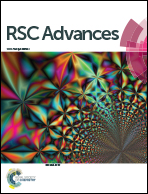Catalpol attenuates oxidative stress and promotes autophagy in TNF-α-exposed HAECs by up-regulating AMPK†
Abstract
Oxidative stress and autophagy dysfunction are critical factors in the pathogenesis of atherosclerosis. Adenosine 5′ monophosphate-activated protein kinase (AMPK) plays an important role in inhibiting oxidative stress and promoting autophagy. Catalpol, an iridoid glucoside extracted from the root of Rehmanniae glutinosa L, was reported to produce a potent antioxidant effect. However, the mechanism of catalpol inhibiting oxidative stress and its effect on AMPK remain unclear. This study aims to investigate the potential role of catalpol in regulating oxidative stress and autophagy in tumor necrosis factor-α (TNF-α)-treated human aorta epithelial cells (HAECs), and the important role of AMPK involved in catalpol's effects. In the present study, effects of catalpol on inhibiting oxidative stress and the related adhesion, apoptosis and promotion of autophagy were demonstrated. Catalpol also produces a potent effect on activating AMPK in TNF-α-treated HAECs. Mechanistically, the effects of catalpol on inhibiting oxidative stress and increasing the autophagy level were partly blocked by a pharmacological AMPK inhibitor, compound C or AMPK small interfering RNA, indicating that catalpol performed such protective effects by activating AMPK. In summary, this study demonstrated that AMPK is a key treatment target for endothelial cell injury and catalpol confers protection on TNF-α-treated HAECs by up-regulating AMPK activity. Catalpol has highly favorable characteristics for the treatment of atherosclerosis.



 Please wait while we load your content...
Please wait while we load your content...